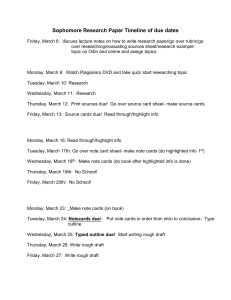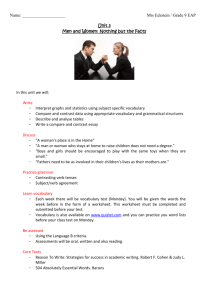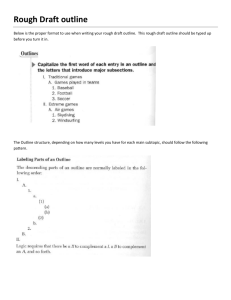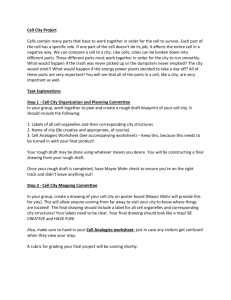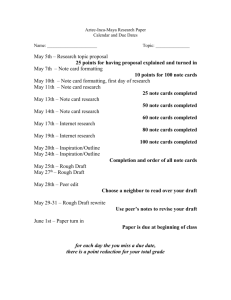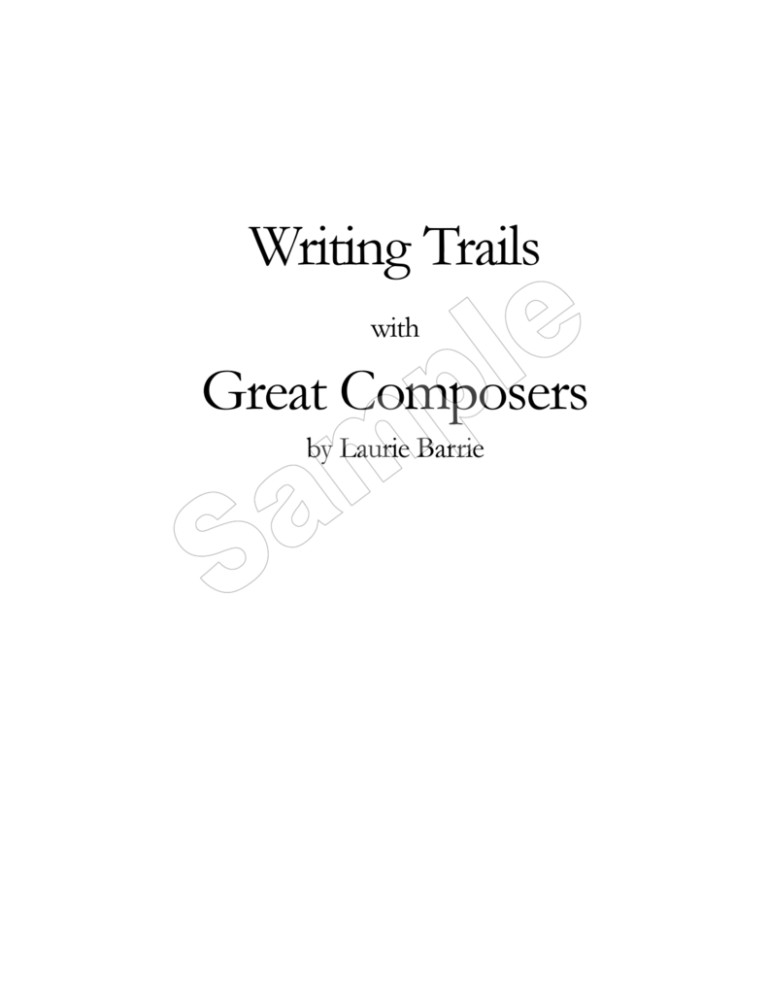
Writing Trails
with
Great Composers
by Laurie Barrie
Table of Contents
1. Acknowledgements ............................................................................................................................................. 4
2. Keyword outline introduction, overview, proposed schedule ...................................................................... 5
3. The “Charles Gounod” example .................................................................................................................... 10
4. Rough draft and final draft grading ................................................................................................................ 12
5. “Antonio Vivaldi” story & outline .................................................................................................................. 14
6. “Johann Sebastian Bach” story and outline .................................................................................................. 16
7. “George Frederic Handel” story and outline................................................................................................ 18
8. “Franz Joseph Haydn” story and outline ...................................................................................................... 20
9. “Wolfgang Amadeus Mozart” story and outline .......................................................................................... 22
10. “Ludwig van Beethoven” story and outline ................................................................................................ 24
11. “Franz Peter Schubert” story and outline ................................................................................................... 26
12. “Felix Mendelssohn” story and outline ....................................................................................................... 28
13. “Frédéric Chopin” story and outline ........................................................................................................... 30
14. “Franz Liszt” story and outline .................................................................................................................... 32
15. “Richard Wagner” story and outline ............................................................................................................ 34
16. “Peter Tchaikovsky” story and outline ........................................................................................................ 36
17. “Antonin Dvorak” story and outline............................................................................................................ 38
18. “Scott Joplin” story and outline .................................................................................................................... 40
19. “Aaron Copland” story and outline.............................................................................................................. 42
Other books by Laurie Barrie:
Writing Trails with Men of Science
Writing Trails in American History
Immigrant Trails in American History
Acknowledgements
This writing program is based upon
Andrew Pudewa’s “Excellence in Writing” program.
C116 Writing Trails
with
Great Composers
ISBN 1-930443-74-9
Logos School Materials
110 Baker Street
Moscow, ID 83843
Toll free: 866-562-2174
www.logosschool.com
Call for a free catalog
Copyright ©2004 Laurie Barrie. All rights reserved. A teacher (including home school parents) may reproduce
pages for use within a single classroom. Any other use requires the permission of the publisher.
4
Writing Trails
with
Great Composers
Introduction
The goal of this resource is for children to learn to create a key word outline and retell the basic ideas of the text
by using their key words. This resource provides a routine format of outlining, vocabulary study, and thesaurus
study, to develop competency, independence, and creativity in writing.
Overview
1. INTRODUCTION: A sample has been given on page 10 and page 11. Use this sample as an introduction to
this writing program. Write the Charles Gounod story on the board. Choose a student reader to read the story
aloud. After the story has been read, tell the students they should choose three to four words from each
numbered section that will help them remember the main idea of each sentence. Have the students write down
three to four key words for each numbered section on notebook paper. Next, divide the students into pairs and
have them retell the story to their partner by using their key word outlines. Tell the students the goal is not to
retell the story verbatim. The goal is not to memorize the story. The goal is to communicate the main idea of the
story by using their key words. After the stories have been retold, have the class openly discuss which key words
should most likely have been chosen, and write them on the board. Talk briefly about the importance of
choosing KEY words. Read the Herschel rewrite. Point out how the new chosen synonyms were used in the
story. Encourage the students to write expressively and add creativity to the story while maintaining the facts
from their key words.
2. STORIES FOR OUTLINING: Use the following format for weekly writing assignments:
a. student reader reads story aloud
e. thesaurus work independently
b. students read story silently
f. key word outline independently
c. rewrite title
g. retell story in pairs (optional)
d. vocabulary work independently
h. writing independently
3. VOCABULARY: Have a dictionary readily available for every student. Be sure to inform students that some
vocabulary words contain suffixes, and they should look up the root word. Have them carefully match the
proper meaning of the word by reading the vocabulary word in context. When choosing a new synonym, have
them add the original suffix to the new word.
4. THESAURUS: Have a thesaurus readily available for every student. Be sure to inform the students that each
thesaurus word chosen will be used in place of the vocabulary words when rewriting from their key word
outline.
5. KEY WORD OUTLINE: Have the students choose three to four key words from each section. They are to
look at their key word outlines only, not the original story when writing.
6. ROUGH DRAFT: Every lesson should have a rewrite from the key word outline in rough draft form. Each
rough draft should be double-spaced to allow plenty of room for editing. Rough drafts should be due two days
after the writing assignment has been given.
7. FINAL DRAFT: After editing, the final draft should be written with single spacing, and carefully checked by
the students before turning in. All three papers should be included when turning in the assignment. The final
draft should be placed on top, with the rough draft and outline following.
8. GRADING: Follow the grading sheet provided and staple to each student’s paper.
5
Proposed Schedule
Week
Lesson
Page #
Weekday
Work Assigned
One
Vivaldi
14 & 15
Monday
by Friday
Two
Vivaldi
15
Three
Bach
16 & 17
Monday
Wednesday
Friday
Monday
by Friday
Four
Bach
17
Five
Handel
18 & 19
Six
Handel
19
Seven
Haydn
20 & 21
Eight
Haydn
21
Nine
Mozart
22 & 23
Ten
Mozart
23
Eleven
Beethoven
24 & 25
Twelve
Beethoven
25
Thirteen
Schubert
26 & 27
Fourteen
Schubert
27
Fifteen
Mendelssohn
28 & 29
Read story aloud
Begin worksheet
Complete #1-4
Begin rough draft
Rough draft due
Final draft due
Read story aloud
Begin worksheet
Complete #1-4
Begin rough draft
Rough draft due
Final draft due
Read story aloud
Begin worksheet
Complete #1-4
Begin rough draft
Rough draft due
Final draft due
Read story aloud
Begin worksheet
Complete #1-4
Begin rough draft
Rough draft due
Final draft due
Read story aloud
Begin worksheet
Complete #1-4
Begin rough draft
Rough draft due
Final draft due
Read story aloud
Begin worksheet
Complete #1-4
Begin roughdraft
Rough draft due
Final draft due
Read story aloud
Begin worksheet
Complete #1-4
Begin roughdraft
Rough draft due
Final draft due
Read story aloud
Begin worksheet
Complete #1-4
Monday
Wednesday
Friday
Monday
by Friday
Monday
Wednesday
Friday
Monday
by Friday
Monday
Wednesday
Friday
Monday
by Friday
Monday
Wednesday
Friday
Monday
by Friday
Monday
Wednesday
Friday
Monday
by Friday
Monday
Wednesday
Friday
Monday
by Friday
6
Proposed Schedule
Week
Lesson
Page #
Weekday
Work Assigned
Sixteen
Mendelssohn
29
Seventeen
Chopin
30 & 31
Monday
Wednesday
Friday
Monday
by Friday
Eighteen
Chopin
31
Nineteen
Listz
32 & 33
Twenty
Listz
33
Twenty-one
Wagner
34 & 35
Twenty-two
Wagner
35
Twenty-three
Tchaikovsky
36 & 37
Twenty-four
Tchaikovsky
37
Twenty-five
Dvorak
38 & 39
Twenty-six
Dvorak
39
Twenty-seven
Joplin
40 & 41
Twenty-eight
Joplin
41
Twenty-nine
Copland
42 & 43
Thirty
Copland
43
Begin rough draft
Rough draft due
Final draft due
Read story aloud
Begin worksheet
Complete #1-4
Begin rough draft
Rough draft due
Final draft due
Read story aloud
Begin worksheet
Complete #1-4
Begin rough draft
Rough draft due
Final draft due
Read story aloud
Begin worksheet
Complete #1-4
Begin rough draft
Rough draft due
Final draft due
Read story aloud
Begin worksheet
Complete #1-4
Begin rough draft
Rough draft due
Final draft due
Read story aloud
Begin worksheet
Complete #1-4
Begin rough draft
Rough draft due
Final draft due
Read story aloud
Begin worksheet
Complete #1-4
Begin rough draft
Rough draft due
Final draft due
Read story aloud
Begin worksheet
Complete #1-4
Begin rough draft
Rough draft due
Final draft due
Monday
Wednesday
Friday
Monday
by Friday
Monday
Wednesday
Friday
Monday
by Friday
Monday
Wednesday
Friday
Monday
by Friday
Monday
Wednesday
Friday
Monday
by Friday
Monday
Wednesday
Friday
Monday
by Friday
Monday
Wednesday
Friday
Monday
by Friday
Monday
Wednesday
Friday
7
Example Lesson
Charles Gounod
(example)
(1) Charles Gounod was born in Paris, in 1818. (2) His father died when Charles was five years of
age. (3) His mother was a renowned pianist. (4) He loved music from a very early age. (5) A French
composer, Gounod wrote mainly opera and sacred music. (6) He mainly concentrated on works of sacred
music and early composers. (7) Gounod devoted most of his life to musical composition. (8) His first
opera was produced in 1851. (9) His opera music was noted for its lyrical quality. (10) He also wrote
oratorios, masses, and hymns. (11) Charles Gounod died in 1893.
---------------------------------------------------------------------------------------------------------------------------------------------
1. Read the story above and create a new title on the line below.
_____________A Famous French Composer______________
2. Vocabulary: In the story above, underline the vocabulary words listed below and
define each one.
a. renowned: The quality of being widely honored and acclaimed.
b. concentrated: To direct one’s attention or thoughts.
c. quality: Degree or grade of excellence.
3. Thesaurus: Look up the vocabulary words in a thesaurus and write a new synonym to replace each
vocabulary word in your final writing assignment.
Vocabulary word
Synonym word
a. renowned
a. famous
b. concentrated
b. focused
c. quality
c. distinction
10
4. Outline the story by choosing three to four key words from each numbered section. Use your synonym
words in place of each vocabulary word.
(1) Charles Gounod, Paris, 1818
(2) father, died, five
(3) mother, famous, pianist
(4) loved, music, early, age
(5) wrote, opera, sacred, music
(6) focused, sacred, early, composers
(7) devoted, life, musical, composition
(8) first, opera, 1851
(9) opera, music, lyrical, distinction
(10) wrote, oratorios, masses, hymns
(11) Gounod, died, 1893
5. Rewrite the story on a separate sheet of paper using your key-word outline. Use your new title for the
story and underline your chosen synonym words. Always check your work in the following areas:
Title
Indentation
Spelling
Punctuation
Neat cursive
Name & date
A Famous French Composer
Charles Gounod was born in Paris, in 1818. When he was only five years old, his father died.
Charles’ mother was a famous pianist. Charles loved music from a very early age. When Charles
Gounod became a composer, he chose to write opera and sacred music. When he studied, he focused
mainly on sacred music and early composers. Gounod devoted his life to musical composition. He composed
his first opera in 1851. His operas were known for their lyrical distinction. Besides operas, Gounod also
wrote oratorios, masses, and hymns. Charles Gounod died in 1893, at the age of 75.
11
Grading Writing
Key Word Outline Rough Draft
Worksheet
10 ____
Title/indent
4 ____
Underlining
3 ____
Synonyms
3 ____
Grammar
10 ____
Spelling
5 ____
Punctuation
10 ____
Capitalize
5 ____
Content
50 ____
Key Word Outline Final Draft
Title/indent
10 ____
Grammar
10 ____
Spelling
10 ____
Punctuation
10 ____
Capitalization
5 ____
Corrections
25 ____
Cursive
15 ____
Neatness
15 ____
Total
Total
100 ____
Comments: _______________________
________________________________
________________________________
________________________________
Comments: ___________________
____________________________
____________________________
____________________________
Key Word Outline Rough Draft
Worksheet
10 ____
Title/indent
4 ____
Underlining
3 ____
Synonyms
3 ____
Grammar
10 ____
Spelling
5 ____
Punctuation
10 ____
Capitalize
5 ____
Content
50 ____
Key Word Outline Final Draft
Title/indent
10 ____
Grammar
10 ____
Spelling
10 ____
Punctuation
10 ____
Capitalization
5 ____
Corrections
25 ____
Cursive
15 ____
Neatness
15 ____
Total
Total
100 ____
100 ____
Comments: _______________________
________________________________
________________________________
________________________________
Comments: ___________________
____________________________
____________________________
____________________________
Key Word Outline Rough Draft
Worksheet
10 ____
Title/indent
4 ____
Underlining
3 ____
Synonyms
3 ____
Grammar
10 ____
Spelling
5 ____
Punctuation
10 ____
Capitalize
5 ____
Content
50 ____
Key Word Outline Final Draft
Title/indent
10 ____
Grammar
10 ____
Spelling
10 ____
Punctuation
10 ____
Capitalization
5 ____
Corrections
25 ____
Cursive
15 ____
Neatness
15 ____
Total
Total
100 ____
100 ____
100 ____
Comments: _______________________
________________________________
________________________________
________________________________
Comments: ___________________
____________________________
____________________________
_________________________________________________
12
Lessons
13
Name: ____________________
Date: ____________________
Antonio Vivaldi
(1) Antonio Vivaldi was born in Venice, in 1678. (2) He was trained to play the violin by his father,
(3) a violinist at the St. Mark’s Cathedral. (3) In 1703, Vivaldi was ordained as a priest. (4) For many years
he was a music director, training students and composing for weekly concerts. (5) He established an
international reputation as a musician. (6) He mainly composed concertos, oratorios, and operas. (7) A
majority of his concertos use violin as the solo instrument. (8) His music was marked by vigorous rhythms
and strong contrasts. (9) J.S. Bach studied Vivaldi’s work. (10) Antonio Vivaldi died in 1741.
---------------------------------------------------------------------------------------------------------------------------------------------1. Read the story above and create a new title on the line below.
____________________________________________________________________________________
2. Vocabulary: In the story above, underline the vocabulary word listed below, and define each one.
a. established: _______________________________________________________________________
b. vigorous: _________________________________________________________________________
c. contrasts: _________________________________________________________________________
3. Thesaurus: Look up the vocabulary words in a thesaurus and write a new synonym to replace each vocabulary
word in your final writing assignment.
Vocabulary word
Synonym word
a. established
a.
b. vigorous
b.
c. contrasts
c.
14
4. Outline the story by choosing three to four key words from each numbered section. Use your synonym
words in place of each vocabulary word.
(1) ____________________________________________________________
(2) ____________________________________________________________
(3) ____________________________________________________________
(4) ____________________________________________________________
(5) ____________________________________________________________
(6) ____________________________________________________________
(7) ____________________________________________________________
(8) ____________________________________________________________
(9) ____________________________________________________________
(10) ___________________________________________________________
5. Rewrite the story on a separate sheet of paper using your key-word outline. Use your new title for the story
and underline your chosen synonym words. Always check your work in the following areas:
Title
Indentation
Spelling
Punctuation
Neat cursive
Name & date
15



